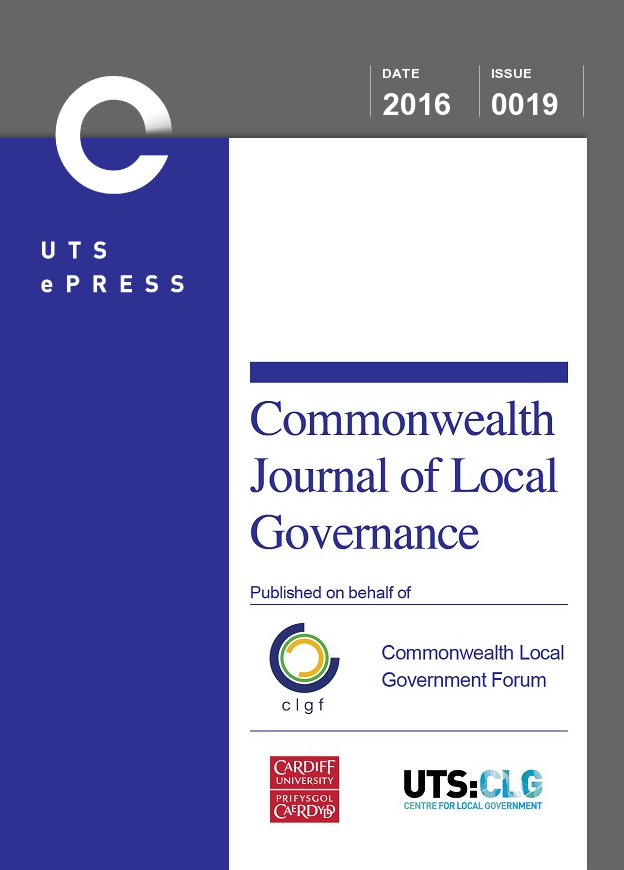Provincial–regional ANC politics in the Northern Cape: corruption or everyday informal practices?
Main Article Content
Abstract
Research over the last decade on local government in South Africa has highlighted that some municipal councils under the political leadership of the Africa National Congress (ANC) have shown weak political leadership, coupled with strong patronage systems, rent-seeking and corruption which have had an impact on the institutional functionality of municipalities in South Africa. Although patronage politics have been predominantly used to analyse the dynamics of post-apartheid local government ANC politics and councillor representation, this prevents us from understanding the representational focus of ANC councillors in decision-making processes. This paper offers an ethnographic insight into experiences of ANC councillors and the political complexities involved in council decision-making. Using ethnographic research, this paper will analyse how a political decision by the ANC provincial party, which was supported by the ANC regional party at local level – to erect a statue of Nelson Mandela in one of the municipalities in the Northern Cape – generated tensions amongst ANC councillors who strongly viewed their primary role as promoters of better ‘service delivery’ rather than approving the allocation of scarce municipal resources for erecting a statue. The paper reveals how the dominant presence of ANC sub-regional structures at local level contribute to the complex interaction of both ANC party political and municipal organisational rules and norms that influence and shape councillors’ choices in decision-making.
Article Details
Issue
Section
Authors who submit articles to this journal from 31st March 2014 for publication, agree to the following terms:
a) Authors retain copyright and grant the journal right of first publication with the work simultaneously licensed under a Creative Commons Attribution License that allows others to share and adapt the work with an acknowledgement of the work's authorship and initial publication in this journal.
b) Authors are able to enter into separate, additional contractual arrangements for the non-exclusive distribution of the journal's published version of the work (e.g., post it to an institutional repository or publish it in a book), with an acknowledgement of its initial publication in this journal.
c) Authors are permitted and encouraged to post their work online (e.g., in institutional repositories or on their website) prior to and during the submission process, as it can lead to productive exchanges, as well as earlier and greater citation of published work (See The Open Access Citation Advantage Service). Where authors include such a work in an institutional repository or on their website (ie. a copy of a work which has been published in a UTS ePRESS journal, or a pre-print or post-print version of that work), we request that they include a statement that acknowledges the UTS ePRESS publication including the name of the journal, the volume number and a web-link to the journal item.
d) Authors should be aware that the Creative Commons Attribution (CC-BY) License permits readers to share (copy and redistribute the work in any medium or format) and adapt (remix, transform, and build upon the work) for any purpose, even commercially, provided they also give appropriate credit to the work, provide a link to the license, and indicate if changes were made. They may do these things in any reasonable manner, but not in any way that suggests you or your publisher endorses their use.
For Issue 13/14, and all issues before, the following copyright applied:
Authors submitting a paper to UTS ePRESS publications agree to assign a limited license to UTS ePRESS if and when the manuscript is accepted for publication. This license allows UTS ePRESS to publish a manuscript in a given issue. Articles published by UTS ePRESS are protected by copyright which is retained by the authors who assert their moral rights. Authors control translation and reproduction rights to their works published by UTS ePRESS. UTS ePRESS publications are copyright and all rights are reserved worldwide. Downloads of specific portions of them are permitted for personal use only, not for commercial use or resale. Permissions to reprint or use any materials should be directed to UTS ePRESS via the journal's main editor, Alison Brown, journal@clgf.org.uk
